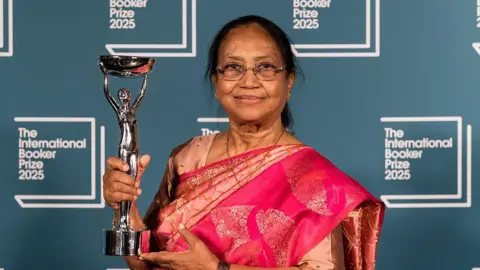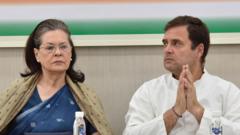A significant political controversy has erupted in India surrounding accusations of "vote theft" as the nation reflects on the outcome of the 2024 elections. Opposition groups are voicing strong claims that the Election Commission of India (ECI) facilitated irregularities that benefitted the ruling Bharatiya Janata Party (BJP). On Tuesday, debates were disrupted in Parliament as opposition MPs insisted on discussing the integrity of the electoral process. This uproar follows the arrest of several key opposition leaders, including Congress party head Rahul Gandhi, in attempts to peacefully march towards the ECI's headquarters.
Gandhi originally brought the allegations to light during a press conference on August 7, where he presented what he described as conclusive evidence of voter manipulation rooted in data from the ECI. While Prime Minister Narendra Modi celebrated a historic third consecutive term, his BJP-led coalition did not achieve the anticipated majority, drawing public scrutiny to the election. Voter turnout reached a substantial 66% from nearly one billion registered voters, representing one-eighth of the global population.
Focusing on Mahadevapura, a constituency within Bangalore Central, Gandhi asserted that over 100,000 instances of manipulated voter entries were identified, including dubious registrations and duplicated voters. His claims included specific incidents, such as an allegation that one voter named Shakun Rani voted twice—a statement rejected by the ECI. Moreover, Gandhi pointed out alarming instances, such as 80 individuals registered at one single address and evidence suggesting the deletion of vital CCTV footage from polling locations. He contended that these discrepancies cost his party no fewer than 48 parliamentary seats, asserting that India's electoral system was compromised.
Despite the gravity of these accusations, both the ECI and BJP have emphatically dismissed Gandhi's claims as unfounded. Responding publicly, the ECI called the allegations "absurd," insisting Gandhi must either retract his statements or formally apologize. In a related statement, the Karnataka unit of the Election Commission noted that the Congress party did not raise formal objections regarding electoral roll revisions ahead of the 2024 elections.
The fallout from Gandhi's allegations has been profound, especially in light of the contentious revision of electoral rolls in Bihar—which has witnessed reductions of approximately 6.5 million names prior to impending elections. This revision process has faced criticism for allegedly disenfranchising voters, particularly among minorities and migrant populations. Many individuals specifically pointed to inaccuracies within the draft rolls, citing issues such as the inclusion of deceased individuals and incorrect photographs linked to voter IDs.
The Supreme Court of India is currently reviewing a series of petitions opposing the electoral roll revision process. As the debate intensifies, Gandhi has amplified his accusations, claiming systematic electoral manipulation on a national scale. Rallying support on the notion of "vote theft," he noted peculiarities like the registration of a 124-year-old in the electoral database, asserting that the issues at hand transcend beyond temporary discrepancies.
In this dynamic situation, the future of India's electoral integrity hangs in a delicate balance, as the nation holds its breath awaiting resolution of these emerging controversies.

















